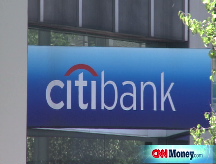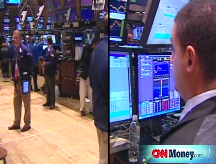Stop bailing out 'good' banks!
Northern Trust's golf outing is a problem because it got $1.6 billion from TARP. The bank should have known better - even though it didn't need bailout funds.

 |
| Northern Trust has come under fire for taking bailout funds and spending frivolously. But judging by how the bank's stock has held up compared to peers, Northern Trust should have probably turned down TARP in the first place. |
NEW YORK (CNNMoney.com) -- Northern Trust has quickly learned that you can't conduct business as usual when you're on the government dole.
The bank, which received $1.57 billion in funds from the Troubled Asset Relief Program, or TARP, last fall, was heavily criticized by lawmakers after it was revealed Tuesday that it held big parties for clients last weekend at a California golf tournament that the bank sponsored.
Several members of Congress wrote a letter to Northern Trust CEO Frederick Waddell Tuesday demanding that the bank "immediately return to the federal government the equivalent of what Northern Trust frittered away on these lavish events."
Now if Northern Trust (NTRS, Fortune 500) did not take any taxpayer money, this wouldn't be an issue. And here's what's ironic..the company didn't need TARP funding in the first place! So this is just another example of the terrible execution that seems to have become a hallmark of the bank bailout.
The Chicago-based bank, which focuses mainly on asset management for affluent clients and banking services for institutions, has largely steered clear of the subprime mortgage nightmare - the festering gangrene plaguing the balance sheets of Citigroup (C, Fortune 500), Bank of America (BAC, Fortune 500) and other big banks.
Unlike Citi, BofA, Morgan Stanley, Goldman Sachs and numerous other TARP recipients, Northern Trust has not posted a quarterly loss during the credit crisis.
Earnings per share in the fourth quarter rose 43% from a year ago, solidly beating Wall Street's expectations. And for all of 2008, earnings per share rose 7%, an impressive feat in one of the worst years ever for banks.
Now this doesn't excuse Northern Trust one bit. The company should have known better and realized that any bank receiving government funds has to be careful with how it spends its money.
The fact that nobody at the bank thought it would be a good idea to, at the very least, scale back its wining and dining at the golf tournament smacks of gross incompetence.
There already have been uproars about lavish bonuses at firms that took TARP funds as well as a political backlash against Citigroup for planning to buy a new corporate jet (it later canceled the order) and Wells Fargo (WFC, Fortune 500) for scheduling a trip for top loan officers to Las Vegas. (The bank subsequently killed the event and all similar "employee reward" programs for the remainder of the year)
"Clearly, Northern Trust had a tin ear on spending," said Alex Brigham, executive director of the Ethisphere Institute, a think tank that has been tracking the government's return on TARP investments.
Waddell attempted to quell the controversy Tuesday. In an open letter to shareholders, clients and staff, he pointed out that the bank was profitable last year and that the sponsorship of the golf tournament and all related events were paid out of "normal operating funds."
That may be true. But it doesn't matter. In an economic period as painful as this, when most consumers are cutting back to get by, shouldn't banks use "normal operating funds" for conducting their actual day-to-day business - not schmoozing?
Waddell made matters worse for himself by having the gall to write this in the letter:
"Northern Trust did not seek the government's investment under the U.S. Treasury's Capital Purchase Program, but agreed to the government's goal of gaining the participation of all major banks in the United States."
This reverse gunpoint robbery argument -- take all our money or your life! -- isn't going to cut it.
There are plenty of regional banks - such as San Antonio's Cullen/Frost Bankers (CFR); Paramus, N.J.-based Hudson City Bancorp (HCBK); and People's United Financial (PCBT) of Bridgeport, Conn. - that decided to not apply for TARP funds. The latter two banks, like Northern Trust, are members of the S&P 500. So they're not small community banks.
Sure, there were reports of how several megabanks reluctantly took TARP funds last fall because then-Treasury Secretary Henry Paulson was concerned about the message it would send to the markets if the government was only handpicking the banks in most dire need of capital for TARP injections.
But that's no longer an issue. Investors have clearly figured out which banks are most troubled and which ones are in better shape. And the "healthier" banks now realize that the restrictions tied to TARP may be lot more onerous than they signed up for.
"Many banks did not need TARP funds but looked at it as a source of cheap capital with what they thought was a relatively benign partner," said Chris Kelly, head of capital markets at Jones Day, a law firm that works with many large banks. "Absolutely, some banks regret taking TARP. The enormous amount of mistrust the government has created in banks is something we've never seen."
So now that new Treasury Secretary Tim Geithner has released more details Wednesday about stress tests regulators plan to conduct to determine which banks need more help, it is my sincerest hope that Geithner fulfills his promise to give the markets more transparency.
The results of the stress tests should be fully revealed to the public. We have a right to know which banks are in most danger and which banks don't need more funding.
What's more, banks that are doing well shouldn't be bullied into taking more capital in order to perpetuate the illusion that the bailout is in the best interest of all banks. We now realize that there is a clear strata of good, bad and ugly banks out there.
In fact, the more stable banks that seem eager to quickly pay back the government should be permitted to do so without penalty. "It's not palatable for the government to refuse money," said Ethisphere's Brigham.
When, and only when, a bank has written its check to the Treasury can it return to spending big bucks on entertaining clients. At that point, they'll only have their shareholders and boards to answer to...not the entire taxpaying public and Congress. ![]()



